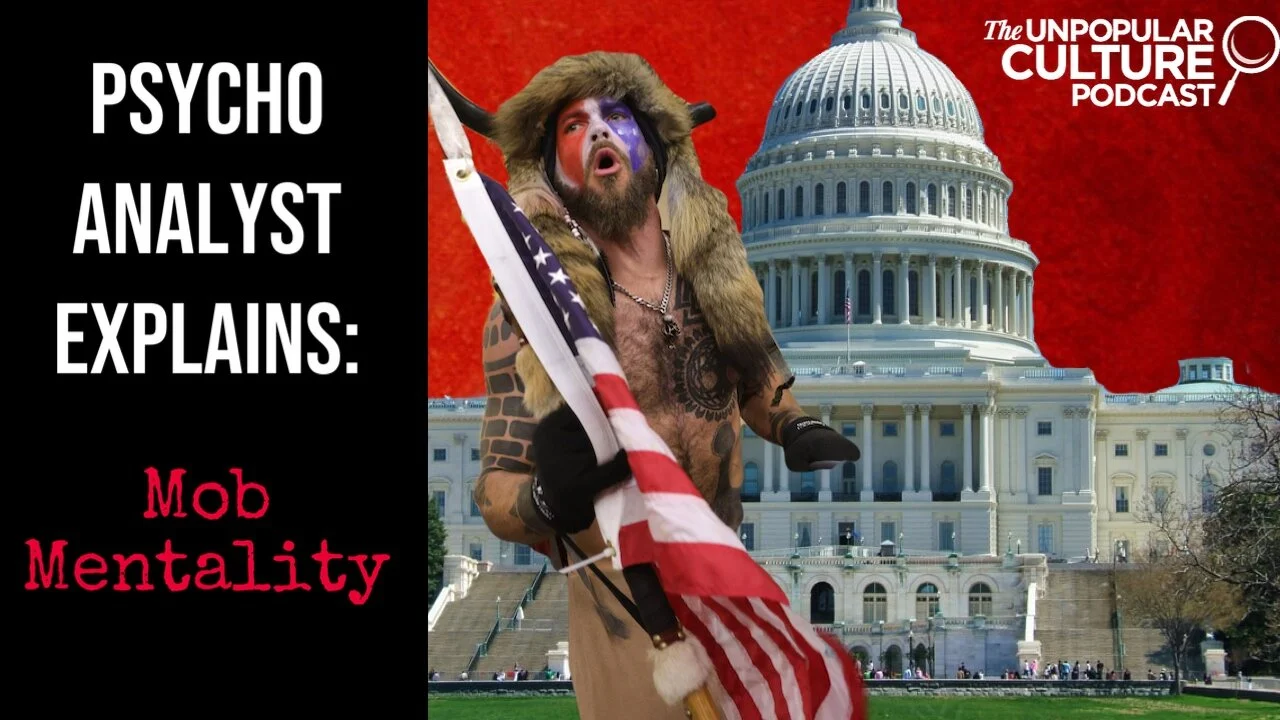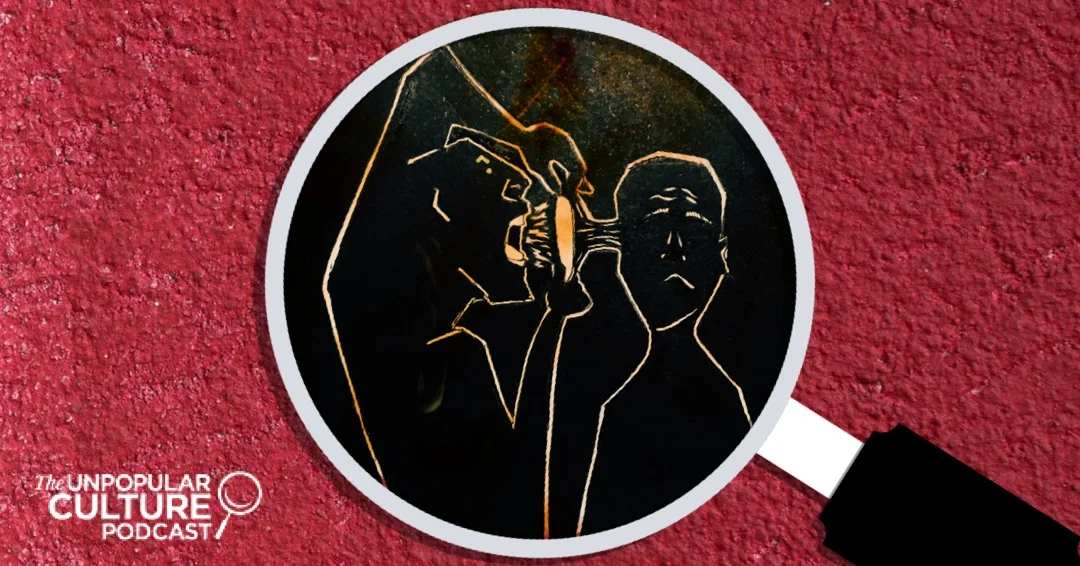👇Watch Below👇
Ep: 233 - How To Incite A Mob: Thoughts on the Capitol - Psychology podcast - Professor Michael Drane - unpopular culture podcast - we are a forensic psychology podcast that focuses on true crime pop culture and psychological phenomenon.
"It’s astonishing how quickly one person’s idea can become the belief system of an entire community.”
In this week's episode, Professor Michael Drane explores the psychology of Mob Mentality within the context of the riot at the Capitol. Mob Mentality usually makes headlines during the holidays--that is, unfortunately, a familiar sight. However, the events that took place last Wednesday are unprecedented. You may be asking yourself "Why did this happen?" or "How could this happen?"
Listen in as he explores the differences between Group Think and Mob Mentality, the 6 Key Symptoms of Group Think, as well as the ideological and spiritual belief systems associated with Herd-Mentality.
Stay safe out there friends, and we hope you enjoy the show.
SHOW notes
People in my personal life know that I am an avid political junkie… I’ve never really liked sports—sports dull me. Politics though…politics are enthralling. I like to think of politics as “sports” for sociologists. Watching political events unfold is watching history unfold. Yet, despite this personal passion, I try to avoid politics on UPC. Why? Because I am a mental health clinician. One of my roles as a mental health clinician is to help educate the public, and to do so, I must remain scientifically objective. Yet, as we witnessed last week, there is an increasing dearth of objectivity in today’s world.
With the anonymity and grandiosity of the internet, people are empowered now more than ever before say whatever they want. They speak emotionally, and in doing so, confuse their emotional reactions and opinions with what is factual and observable.
The bell curve of humanity can be disappointing…unfortunately, many people lack the education or the wherewithal to truly understand what they are saying, or why they are saying it. Checking our own biases at the door and stretching our necks over the fence to see the bigger picture is difficult. It’s easy to get wrapped up in our own corner of the internet. It’s easy to be sensational, and to forget about each other.
Since I started this podcast in 2016, I have tried to balance this societal tightrope—walk my own line with objectivity and facts. But, after the events at the capitol on Wednesday, I don’t know if I can stand where I did and walk that same line. After all—if the events at the Capitol don’t represent the “broken underbelly of society”, then what the hell does?
Stepping into the political arena is not easy, but shining this light makes it necessary. Despite my best intentions, despite the truth, there will be those that react emotionally. This is normal—we aren’t all ready to change our worldview. We’re not all ready to hear the other side. BUT. We should not lose hope. I have a responsibility to educate the public, and I am passionate about doing so. This responsibility outweighs the consequences of anger. This responsibility outweighs the consequences of division.
What we saw at the capitol was unacceptable, but the presence of Mob Mentality was very obvious. The consequences of not thinking objectively were playing out in real time. The different realities that the internet cultivated clashed, and the capitol was the breaking point—it was the result of an echo chamber finally breaking.
Groupthink vs. Mob Mentality
There is very little difference between Groupthink and Mob Mentality—the terms are generally interchangeable. However…
Mobs are often seen as violent or aggressive groups.
But it should also be said that groups rallying to enact change isn’t always a bad thing.
Being in a mob is basically being a part of the “in crowd”. To go along with the overwhelming majority.. We see this everywhere in our culture, from religious groups to school associations.
With the herd mentality, the intelligence level of the group seems lower than any one individual inside the group.
The mob moves as one singular entity, consisting of individuals. In the black Friday scenario, individuals scrambling over each other like bacteria in a petri dish.
Groupthink
Groupthink is a communication theory and term coined by social psychologist Irving Janis (1972).
Groupthink happens when a group makes faulty decisions because group pressures lead to a deterioration of "mental efficiency, reality testing, and moral judgment" (p. 9).
Groupthink is the manifestation of several people thinking as one singular mind, with a blind devotion to peer group pressure irrespective of the facts or consequences.
Groups who are affected by Groupthink:
Ignore alternatives.
Tend to take irrational actions that dehumanize other groups.
Try to minimize conflict and reach a consensus decision without critical evaluation of alternative ideas or viewpoints.
The 6 Symptoms of Groupthink:
Illusion of invulnerability
The belief that your group is in the right and immune to consequences creates the illusion that their cause is just, superior, and moral.
Standing as a single person inside a mob is kind of like being one soldier among the rest of an army. You look around at the mob’s collective strength, and you feel stronger than you ever would alone.
This makes you feel invulnerable and powerful.
Collective Rationalization
Members discount warnings that they might be doing harm and ignore any outside perspectives that would make them discount even a hint that their actions and beliefs might be wrong
For the individuals in the mob, it becomes easy to rationalize anything the mob does. Because after all, everyone around you is doing it too..
Belief in a Moral Cause
Because Members believe in the righteousness of their cause and they ignore the ethical or moral consequences of their choices.
The mob’s sense of justice draws a sharp contrast between them and everyone else.
Because the mob is convinced their cause is just, it becomes easy to justify any actions taken in the name of their cause… even if those actions mean hurting other people.
Individuals in the mob find themselves throwing out their own morality and replacing it with the morality of the group. People in a mob will do horrendous things they would never do otherwise.. like looting, murdering, torturing.
They put a direct pressure on dissenters and are put under pressure not to express arguments against any of the group's views.
Us vs. Them
Mobs tend to hold a negative view of outsiders as the "enemy" make effective responses to conflict seem unnecessary.
Whatever stands in the path of the mob is in the way
To the mob… If you’re not with us, you’re against us.
This mindset makes it easier to dehumanize and fight against anyone who disagrees with the mob.
Illusion of Unity
The majority view and judgments of the mob are assumed to be unanimous, but history shows us that there are always dissenters in the midst of the herd.
The problem is that these dissenters are afraid to speak up against the group.
Not only are people censored by other members, but the Members sensor themselves.
This creates another phenomenon called “The spiral of silence” as the other group members, especially the group leaders pressure down anyone who disagrees with them
Any doubts that the individual people in that group are silenced
The more the mob thinks as one, the less they hear outside perspectives, the more prone the group becomes to fanatical and dangerous coercion methods…
Self-Appointed “Mind Guards”
These are the most fanatical and dangerous people in the group
They act as Lieutenants to the group leaders, protecting the group and its leaders from any information that causes doubt or is contradictory to what the group is doing.
Rigid and irrational, the mind guards will take extreme measures to preserve the consensus, even to the point of attacking any who disagree and silencing anyone who disagrees with what the group is doing.
References
HELP SUPPORT THE SHOW BELOW
Unpopular Culture Podcast is a psychology podcast hosted by Professor & Psychotherapist Michael Drane. With help from professionals in different fields, he seeks to shine light into the broken underbelly of society.
Listen as he takes on the psychology behind subjects like:
True Crime: serial killers, murders, stalkers, cults, forensic analysis
Psychology: mental illness, social phenomenon, mob mentality, psychoanalysis, etc.
Culture: Sexuality, Satanic Panic, love, Tv analysis, movie analysis.
We are an independent psychology podcast. Help us keep UPC free of ads and on the air. Please consider supporting the show and get access to our "Stalkers Only" archive, and help be a part of the creative process.
Support the Show! —> patreon.com/upcpodcast
YOU CAN FOLLOW US HERE OR ANYWHERE YOU FIND AWESOME PODCASTS
SPOTIFY
ITUNES
STITCHER
PLAYERFM
IHEARTRADIO
👇Listen Below👇







